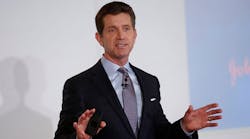Johnson and Johnson (IW 500/16) Chief Executive Officer Alex Gorsky, the head of world’s largest health-care company, called for keeping some provisions of Obamacare intact as President Donald Trump and Republicans move to repeal the law.
Gorsky, who was among a dozen top business leaders who met with Trump Monday on his first full working day as president, said Tuesday he will advocate to keep coverage of pre-existing conditions and people staying on their parents’ insurance until they are 26, as well as a competitive individual insurance market. J&J also supports moving toward value-based health care, whereby prices for drugs and services are based on the quality of care.
“We hope lawmakers take the same cooperative spirit, putting patients first as we move through debate about the future of our health-care system,” Gorsky said on a conference call about the drugmaker’s fourth-quarter results.
The call was the first opportunity for analysts and investors to question a major drugmaker on its priorities under the new administration, after Trump surprisingly attacked the industry on high drug prices and moved toward undoing the health-care law created by his predecessor. Gorsky said it’s important that the industry explains how its products help lower the overall cost of health care.
Weak Outlook
Earlier in the day, J&J gave a 2017 profit forecast that was lower than analysts anticipated, blaming the impact of the stronger dollar, as negotiations drag into weeks with Swiss biotechnology company Actelion Ltd., potentially its largest deal ever. J&J is in exclusive talks with Actelion, a maker of drugs for pulmonary arterial hypertension that has a market value of about $24 billion. While the companies tentatively agreed on a price, people with knowledge of the matter said earlier this month that the discussions continued on valuing a new unit that would house Actelion’s research and development assets. J&J said the talks are ongoing, declining to comment specifically on the deal.
J&J shares fell as much as 2.4 percent, the biggest intraday drop since Dec. 7.
Negotiating Prices
Trump has suggested the government should negotiate for better drug prices, a move long opposed by the industry and Republican lawmakers.
“It’s incumbent upon us as an industry to price responsibly,” Gorsky said on the call. “We have attempted to do that. We believe that has in fact been our practice.”
New Brunswick, New Jersey-based company -- whose businesses include consumer brands like Johnson’s baby care and Neutrogena as well as medical devices -- didn’t see an uptick in business after the Affordable Care Act was passed in 2010, according to Chief Financial Officer Dominic Caruso. A reversal won’t hurt the company’s margins, the CFO said.
Obamacare Costs
Without clarity on what will replace Obamacare, there are concerns that the 20 million people who gained insurance under the program may lose coverage. J&J incurred about $1.4 billion in costs related to the ACA, including drug fees and rebates. While J&J is waiting to see if these costs, as well as a deferred medical device tax, will remain under any policy changes, they have been factored into the 2017 guidance, Caruso said.
The CEO meeting with Trump on Monday wasn’t focused on health care but rather on growing the economy, Gorsky said, adding he is optimistic that tax reform will happen.
While talks with Actelion are ongoing, Gorsky said he will continue to pursue opportunities to deploy capital that would improve shareholder value. In recent years, J&J has been expanding its pharmaceuticals business to offset slower growth in consumer products and medical devices. As its blockbuster arthritis treatment Remicade faces new competition in the U.S. from a cheaper version of the product, called a biosimilar, J&J has been looking to expand into new drug categories.
Larger deals of more than $1 billion have generally been more challenging and J&J has preferred to focus on smaller ones. J&J also said Tuesday it is exploring potential opportunities for its diabetes device units, which Caruso said in a phone interview have been hit by price declines in recent years.
By Jared S. Hopkins



